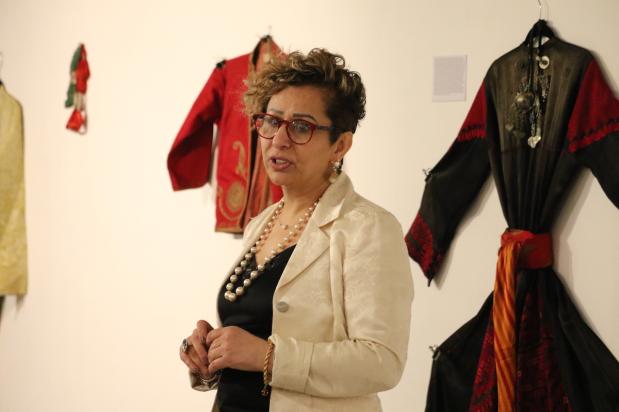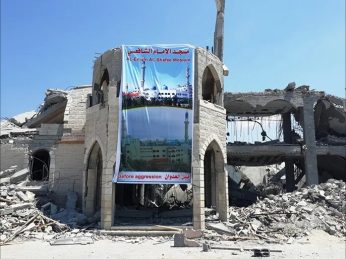In a low-lit gallery in central London Suhad Jarrar-Browne sat on a red embroidered cushion surrounded by a rich array of Palestinian artifacts. Brass coffee pots were lined neatly in a row on a table nearby. Intricately-embroidered dresses hung from the wall behind her carefully woven with elaborate designs passed down through families for centuries.
Suhad looked at home surrounded by the artifacts she has affectionately collected for over 20 years. For this exhibition was all about home – or bayt in Arabic – which as Suhad explained is a central element of her identity as a Palestinian. “I wanted to bridge the gaps between the Arab world and the western world” Suhad told the audience: “I wanted to introduce Palestinian and Arab Muslim culture to the UK and show people how we live. We’re all humans with the same dreams and aspirations at the end of the day.”
Suhad’s message was one of positivity of hybridity and the art of hospitality. “Hospitality is an important part of what it means to be Palestinian” she explained: “We have many rituals based around the art of serving coffee of allowing the spices and grounds to mix and how we serve our guests.” “The pieces I have collected here try to showcase that and offer a window into our culture” she added.
Having moved to the UK in 1996 Suhad has lived between Hertfordshire north of UK capital London and Jordanian capital Amman for the past 20 years. Her interest in collecting Palestinian artifacts began almost immediately after arriving in the country she explained:
I brought a few items with me from Palestine when I came to the UK bits and pieces here and there that my family members didn’t want to keep. British people have a special interest in antiques so I was keen to share the things I had collected with the public. I thought I should use my collection to make a difference in my community.
Her passion for hosting exhibitions was sparked while working for the British Museum as an outreach officer planning exhibitions for schools and community centers. “We actually had our very own bayt shar – a tent made of camel hair – to host the exhibit in so I traveled around the UK with the tent teaching people and children about our culture” Suhad remembered fondly. “From there I started my own exhibition Bayt and despite challenges and illnesses in my personal life my family and I have put together this beautiful display” she said.
Tonight’s exhibition was in many ways a celebration of all aspects of Palestinian culture from home and hospitality to calligraphy costumes and music. Julia Katerina a British-German musician and singer who has adopted many aspects of Palestinian culture through her work in the region played a moving selection of old Arabic and Palestinian songs. Dressed in a floor-length thobe – or traditional Palestinian dress from Suhad’s collection – Julia played the oud as the audience listened intently. Her rich powerful voice ran through the hall as she sang the old Palestinian national anthem mawtini based on a poem written by iconic Palestinian poet Ibrahim Tuqan shortly before the Great Revolt of 1936. “My homeland my homeland” she sings: “Glory and beauty are in your hills pleasure and hope are in your air will I see you?”
As the evening drew to a close the audience ventured into the cold London night with the sounds of Palestine ringing in their ears. Bayt – The Art of Arab Hospitality will be at P21 Gallery in London until 26 January.
– Source: The Middle East Monitor (MEMO)













